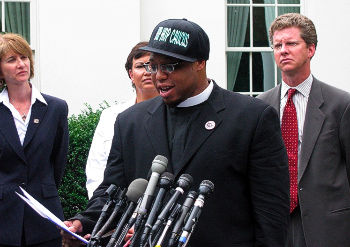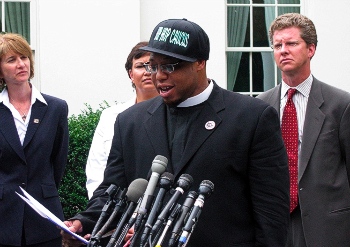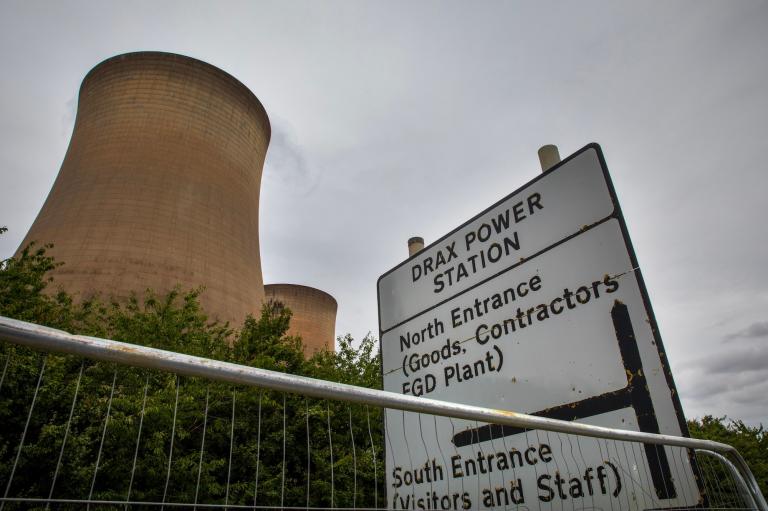 Rev. Lennox Yearwood Jr., president of the Hip Hop Caucus, discusses the Green the Block partnership. In the background (L-R) are Dept. of Energy Undersecretary Kristina Johnson, Environmental Protection Agency Administrator Lisa Jackson, and Housing and Urban Development Secretary Shaun Donovan. Kate Sheppard / GristEnsuring that low-income communities and minority youth benefit from green jobs programs is the goal of a new partnership between the White House and two grassroots organizations — Hip Hop Caucus and Green For All.
Rev. Lennox Yearwood Jr., president of the Hip Hop Caucus, discusses the Green the Block partnership. In the background (L-R) are Dept. of Energy Undersecretary Kristina Johnson, Environmental Protection Agency Administrator Lisa Jackson, and Housing and Urban Development Secretary Shaun Donovan. Kate Sheppard / GristEnsuring that low-income communities and minority youth benefit from green jobs programs is the goal of a new partnership between the White House and two grassroots organizations — Hip Hop Caucus and Green For All.
Two Cabinet members and leaders of the grassroots groups unveiled the Green the Block initiative Tuesday at a White House press conference, describing the partnership as as both a campaign and a coalition that is designed to build political support for greening efforts in low-income and minority communities..
“The 20th century was defined by civil rights and The 21st century will be defined by clean energy,” said Rev. Lennox Yearwood Jr., president of the Hip Hop Caucus. “Future generations will measure us by our success in transitioning from a fossil fuel economy to a clean energy economy, and in the process building opportunity and prosperity for our most economically disenfranchised communities.”
“We have to convince our generation that this truly is our lunch-counter moment of the 21st century,” said Yearwood, referring to the sit-ins held at segregated diners during the Civil Rights era.
The initiative will officially kick-off with a day of service on September 11, 2009 — part of the White House’s already announced United We Serve program. The Green the Block website has more information on local initiatives taking place around the country.
“September 11 is about bringing people together to recognize that change happens not in the corridors of Washington, DC, but it happens in the streets of Detroit, Cleveland, San Francisco, Oakland, Richmond, and cities across the country,” said Phaedra Ellis-Lamkins, CEO of the Oakland-based group Green for All.
The cabinet members — EPA Administrator Lisa Jackson and Housing and Urban Development Secretary Shaun Donovan — touted some of the investments that the Obama administration has made to assist low-income Americans through greening efforts. In the economic stimulus package, $14 billion is designated for housing upgrades, including $5 billion to make low-income housing more energy efficient. Noting that the government currently spends $5 billion a year providing monetary assistance for energy bills to low-income households, Donovan said investments like those in the stimulus plan will help offset costs for families and the government in the long run.
Jackson noted the EPA’s Tuesday announcement of $61 million for brownfields revitalization efforts. The funds will go toward job training programs.
Jackson also touted the climate and energy bill that passed the House in June as another potential means of growing the green economy and creating new jobs. Green for All’s Ellis-Lamkins praised the House bill for including provisions that help ensure jobs will be created in low-income and minority communities, which include local hiring requirements and devotes a portion of pollution permit revenues to job training programs. She said it will be important to get these communities engaged in the debate as the bill moves in the Senate, in order to ensure that this type of provision is included in the final bill.
“If communities of color aren’t engaged, you won’t see provisions like that,” said Ellis-Lamkins.
Video: Green jobs adviser Van Jones talks about green jobs efforts and how the Obama administration can work with underserved communities to ensure they have access to the benefits and opportunities of a clean energy economy.




